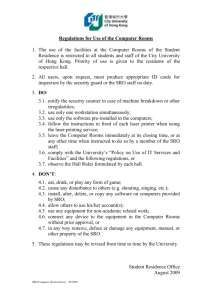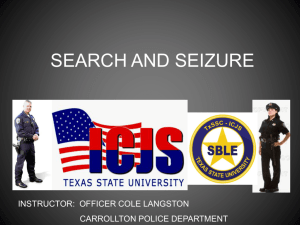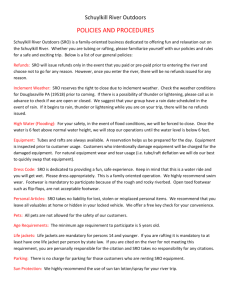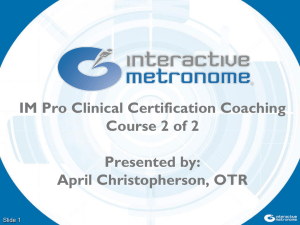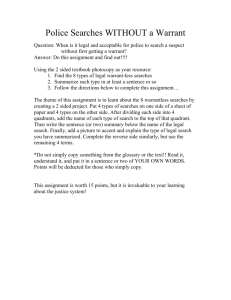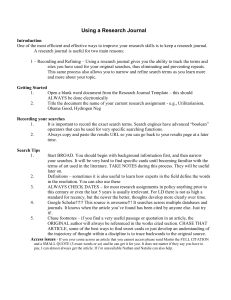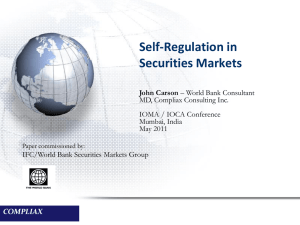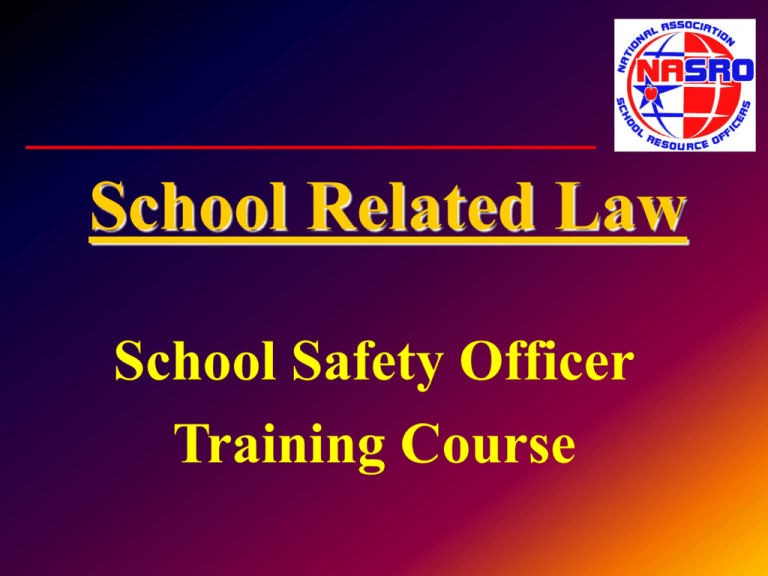
School Related Law
School Safety Officer
Training Course
Copyright Warning
The material contained herein is the sole property of the National Association
of School Resource Officers Inc. a non-for-profit corporation.
No part of this presentation may be reproduced or utilized in any form or by
any means, electronic or mechanical, including photocopying, recording,
or by any information storage and retrieval system, without permission in
writing from:
NASRO, 14301 FM 315 N., Chandler, Texas 75758.
Legal Issues for the SSO
•
•
•
•
Due Process
School Searches and Seizures
Interviews/Interrrogations in Schools
Risk of Civil Liability
PROCEEDINGS
Adult
Juvenile
1.
Criminal in nature
2.
Arrested
3.
Charged
Accused of Crime under penal
4.
code
5. Given a public trail – formal
5.
6. Found guilty of criminal
offense by impartial judge or 6.
jury
1.
2.
3.
4.
.
Civil in nature
Taken into custody
Prosecutor petitions court for
juvenile adjudication
Alleged violation comes under
juvenile or family code
Private hearing – more informal
Adjudicated delinquent by judge
acting as a kindly parent
PROCEEDINGS
Adult
Juvenile
7. Sentenced
8. Might get probation
9. May sent to jail, prison or
other incarceration
10. If incarcerated, serves
sentence
11. Judge/jury determines length
of stay
12. Purpose is punishment and
deterrence
13. Released on parole
7. Disposition
8. Might get probation
9. May be committed to juvenile
facility
10. If committed, most likely
indeterminate –longest
possible is age of majority
11. Release determined by when
rehabilitated
12. Purpose is rehabilitation &
salvation
13. Released on aftercare
Juvenile Due Process:
Three(3) U.S. Supreme Court Cases
I.
II.
III.
In re Gault, 387 U.S. 1(1967)
Tinker v. Des Moines Independent Community School
District, 393 U.S. 503(1969)
Goss v. Lopez, 419 U.S. 565 (1975)
In re Gault, 387 U.S. 1(1967)
FACTS: On June 8, 1964, a 15 year-old Gerald Francis Gault and a
friend were parents were never shown the complaint that was filed
against their son, The complainant did not appear at any hearing and
no written record was made of the hearings. Gault was committed to
the State Industrial School as a delinquent until he reached majority,
a total of six years from the date of the hearing. The maximum
punishment for an adult found guilty of the same offense was a fine
from $5 to $50 or imprisonment for a maximum of two months.
ISSUE: Is a juvenile entitled to procedural due process rights
during the adjudication stage of a juvenile proceeding? YES.
In re Gault, 387 U.S. 1(1967)
DECISION: Juveniles are entitled to procedural rights in proceedings (such as
adjudication of delinquency) that might result in commitment to an institution in
which there freedom would be curtailed. These rights are:
1. Right to reasonable notice of charges;
2. Right to counsel, his or her own, appointed by court if indigent;
3. Right to confront and cross examine witnesses; and
4. Privilege against self-incrimination, including right to remain
silent.
CASE SIGNIFICANCE: This is the most important case ever to be decided by
the Supreme Court in juvenile justice and is the most widely known case on the
rights of juveniles. Essentially stating, albeit juvenile proceedings are civil in
nature, require many of the due process protections afforded adults in criminal
proceedings.
Tinker v. Des Moines School District,
393 U.S. 503(1969) *
This is a free speech case involving the question of whether school officials
could prohibit students from wearing armbands to protest the Vietnam
War.
The Supreme Court held:
1)
that students “do not shed their First Amendment rights at the schoolhouse
gate.” ;
2)
Accordingly, schools may not prohibit a student from engaging in
symbolic speech such as wearing armbands unless school officials can
establish that the symbolic speech materially and substantially interferes
with the requirement of appropriate discipline in the operation of the
institution; and
3)
School officials may not prohibit symbolic speech merely because of their
desire to avoid discomfort and unpleasantness that accompanies an
unpopular viewpoint.
* by virtue of Tinker , schools could no longer limit substantive
protections of the Constitution in the school setting.
Goss v. Lopez, 419 U.S. 565 (1975)
This case involves the short-term suspension of a student. Up
until this time, the courts had not required that any due process rights
be afforded for short-term suspensions. With Goss, however, the
Supreme Court ruled that although schools require flexibility in
student discipline, the rules of due process must apply even if a
suspension is 10 days or less.
DUE PROCESS IN SHORT- TERM SUSPENSIONS
In these cases at a minimum:
The school must tell the student what the charges are;
If the student denies the charges, the school must present it’s
evidence; and
The school must give the student an opportunity present his/her
side of the story.
Why Learn About School
Searches?
• SSO’s have an interest in kids
– Your position is based on impacting kids
• SSO’s have an interest in schools
– Your position was sold as a benefit to the school
• SSO’s have an interest in prosecution
– Establish a working relationship with your
School’s Attorney and Local Prosecutor
Why Learn About School
Searches?
• SSO’s have an interest in training others
– Train the staff, train the students about the law
• LIABILITY
– When lawyers sue, they sue everyone, including
the SSO
– “The SSO should have known and been trained ”
– Between 80’s and 90’s, lawsuits against the
schools rose tenfold
FOURTH AMENDMENT
"The right of the people to be secure in
their persons, houses, papers, and
effects, against unreasonable searches
and seizures, shall not be violated, and
no Warrants shall issue, but upon
probable cause, supported by Oath or
affirmation, and particularly describing
the place to be searched, and persons
or things to be seized."
Warrant Exceptions
Searches without warrants are presumed unreasonable by
the courts; and
If no warrant, the search must fit into these recognized
exceptions:
Automobile: Carroll v. United States, 267 U.S. 132 (1925)
Exigent Circumstances: Schmerber v. California, 384 U.S.757 (1966)
Plain View: Texas v. Brown, 460 U.S. 730 (1983)
Consent: Illinois v. Rodriguez, 497 U.S. 177(1990)
Abandoned Property: California V. Greenwood, 496 U.S. 35 (1988)
Incident to Arrest: Illinois v. LaFayette, 462 U.S. 640 (1982)
Inventory: Colorado v. Bertine, 479 U.S. 367 (1987)
Open Fields: Oliver v. United States, 466 U.S. 170 (1984)
Stop and Frisk: Terry v. Ohio, 392 U.S. 1 (1968)
Inevitable Discovery: Nix v. Williams, 467 U.S. 431 (1984)
Warrant Exceptions
• Administrative Searches
–
–
–
–
–
–
School Searches
Employee drug testing or searches
Health inspections
DUI checkpoints
Border searches
Probation orders
Which of the previously described
search warrant exceptions apply in
the school environment?
Application of 4th
Amendment
• 4th Ammend. applies only to Government
actors
– Security
– School searches
• Exclusionary Rule
– Unlawfully seized evidence cannot be used
• Civil Liability
Standards for Searches
• Reasonable Suspicion vs. Probable Cause
•
•
•
•
Role of the SSO vs. Law Enforcement Officer
Role of the Administrator
Role of the Teacher
Role of Security
Balancing: Privacy v.
Government Interest
• What’s the Expectation of Privacy?
– Low: Lockers, desks, automobiles
– Medium: purses, book bags
– High: clothing, body
• Government Interest ?
– Low: school rules
– Medium: criminal laws, student safety
– High: immediate safety
Is the Search Justified at It’s
Inception ? (object of the search)
• Lockers, desks
– joint ownership, give notice in handbook,
policies
• Automobiles
– student owned, give notice of intent to regulate
• Pockets, coats
– student owned, reasonable suspicion required
Is the Search Justified at It’s
Inception ? (object of the search)
• Book bags, purses, wallets
– student owned, reasonable suspicion required
• Canine searches
– limited to lockers, autos, classrooms?
• Metal detectors
– document need, have written policies, advanced notice
Is the Search Justified at It’s
Inception ? (object of the search)
• Drug testing
– document need, written policies, advanced notice,
safeguard privacy, directed at group with reduced
expectation of privacy
• Strip searches
– Greatest threat for civil liability, no group search,
Individualized only under exigent circumstances
– Many civil liability cases involve the search for money
4th Amendment Analysis
•
•
•
•
Does the 4th amendment apply?
What is the Nature of the Intrusion?
What is the Standard for the Search?
Was the search limited to the reasons for
justification? (Scope of Search)
• What is the remedy should the search be
unlawful?
• What other points should be considered?
Noteworthy School Search
Cases for the SSO
“ Yes, we are under the constitution, but
the constitution is what we say it is. ”
Chief Justice Charles Hughes
Analysis of Evidence/Officer Conduct
Mere
Whim
Reasonable
Suspicion
Probable
Cause
Beyond
Reasonable
Doubt
Leading Appeals Court Cases re:
4th Amendment Issues in Schools
New Jersey v. TLO (1985 THE bright line case)
Veronia School Dist. v. Acton (1995)
Pottawatomie ISD #92 v. Earls, et al (2002)
Illinois v. Dillworth (1996)
Wisconsin v. Angelia D.B. (1997)
New Mexico v. Josue T. (1999)
In re: William V v. California (2003)
New Jersey v. T.L.O. (1985)
• Teacher found two girls smoking in the
restroom
• One girl admitted, TLO denied it
• Principal searched her purse and found
cigarettes and rolling papers
• Searched further and found marijuana, and
large quantity of money
New Jersey v. T.L.O. (1985)
• Does the 4th Amendment apply to school
officials?
• Was the search justified at it’s inception?
• Was the search reasonable?
• What is the expectation of privacy for
students?
• What is required before the search is valid?
New Jersey v. T.L.O. (1985)
• Court found the Principal was justified
• Had reasonable suspicion that TLO was
smoking
• Once finding evidence of drug use, the
principal was justified in looking further
• Search was limited to each suspected
violation
New Jersey v. T.L.O. (1985)
• Balancing expectation of privacy vs.
government interest
• “A search of a student is justified at it’s
inception, by a teacher or school official
when there are reasonable grounds for
suspecting the search will turn up evidence
the student has violated the law or school
rules.”
Veronia School Dist. v. Acton (1995)
• Acton was refused participation on the
football team for refusing consent
• Student athletes subjected to random
(urinalysis) drug testing
• History of student drug use at the school
• Athletes were “leaders”, and subject to
injury and thus subject to this new policy
• Policy unanimously approved by parents
Veronia School Dist. v. Acton (1995)
• US Supreme Court ruled a public school
system may randomly drug test student
athletes
• Court said “athletes have a reduced
expectation of privacy”
• Drug problem of the school could be
addressed by the testing of athletes
• Protect student athletes against drug related
injury
Pottawatomie ISD v. Earls, et al (2002)
U.S. Supreme Court case
Similar to Veronia analysis, but this school policy,
“… requires all middle and high school students
to consent to urinalysis testing for drugs in order to
participate in any extracurricular activity.”
The court held:
”… policy is reasonable means of furthering the
School District’s important interest in preventing and
deterring drug use among its school children and does
not violate the fourth amendment.”
Pottawatomie ISD v. Earls, et al
(continued)
“ …Court must review the policy for
‘reasonableness’, the touchstone of constitutionality.”
“ …In contrast to the criminal context, a probablecause finding is unnecessary in the public school
context because it would unduly interfere with
maintenance of the swift and informal disciplinary
procedures that are needed.”
“… Because the ‘reasonableness’ inquiry cannot
disregard the schools’ custodial and tutelary
responsibility for children.”
Illinois v. Dillworth (1996)
• Officer searched a student for drugs based
on information provided by two teachers
• SRO searched based on Reasonable
Suspicion
• The search was negative, but based on the
suspects actions, the officer searched a
flashlight in the suspect’s hand
• Officer recovered cocaine from the
flashlight
Illinois v. Dillworth (1996)
•
•
•
•
Illinois Supreme court upheld the search
Ruled Dillworth had diminished privacy in school
Search was “minimally intrusive”
State had an interest in keeping drugs out of
school
• Information supplied to SRO, and his
observations
• SRO was a member of the school staff
• TLO’s reasonable suspicion standard should apply
to the SRO
Wisconsin v. Angelia D.B (1997)
•
•
•
•
•
•
Student told Principal that Angelia had a knife
Principal summoned SRO
SRO conducted a pat-down (negative results)
Locker searched by principal (negative results)
Angelia removed jacket, lifted shirt
Knife recovered from her waistband
Wisconsin v. Angelia D.B (1997)
• Defense filed motion to suppress
• Said the search was “highly intrusive” and
not supported by “probable cause”
• Defense also said “duties of police and school
officials are inherently different”
• State said “school officials need to maintain
a safe and proper educational environment”
Wisconsin v. Angelia D.B (1997)
• Court upheld the search
• Noted the SRO was full time, had an office,
worked closely with school officials
• Said “official responsibilities of SRO is to
assist school officials in maintaining safe
learning environment”
• SRO is qualified to conduct weapon
searches, school officials are not
New Mexico v. Josue T. (1999)
• Josue T. was questioned by Administrator
regarding smoking marijuana.
• Josue T. was “evasive” and smelled strongly of
burnt marijuana, taken to the office
• Josue T. refused to remove his right hand.
Appeared as if he was holding a heavy object.
• Administrator became concerned and considered
it a safety issue. SRO asked to search.
• SRO took hand, removed it from the pocket,
reached into the pocket and recovered a .38
caliber handgun
New Mexico v. Josue T. (1999)
• Defense claimed the search was
unreasonable
• Court said the “school” was justified under
TLO v. New Jersey
• Need to “create a safe and orderly
environment for learning”
• State agreed that TLO applies to SRO’s
when asked to search at request of School
Officials
In re: William V. (2003) 4 Cal Rptr 3d 695
FACTS:
* 6 September 2001 Officer D. Johannes of Hayward (CA) Police
Department and works as SRO at HHS.
* Officer walking toward admin building notices William V.
standing alone w/ school contraband red bandana hanging from
back pocket of trousers. Officer inquires as to contraband rag,
William V. retorts, “What rag? What red rag?”
* Officer decides to escort to office for discipline of school policy.
• Prior to escorting to Principal’s Office a “Terry” search was
conducted for weapons and finds a 5” knife with serrated metal
blade which William admitted he possessed for protection
• Alameda County District Attorney filed Juvenile Petition alleging
one count of felony possession of a knife on school grounds.
In re: William V. v. California
(continued)
Following subsequent hearing, the juvenile court denied William’s
motion to suppress the knife on school grounds. He was
adjudicated and found guilty of a misdemeanor and probation
imposed. He filed a timely notice of appeal.
APPEALS COURT RULING:
“ …trial court properly denied William’s motion to suppress”
“ William contends that Officer Johannes was not a school official
and that , even if he was, the search was still unreasonable .”
A. The reasonable suspicion standard applicable to school
officials applied to Officer Johannes as a School Resource
Officer.
B. The initial detention and subsequent search were reasonable.
In re: William V. v. California
(continued)
B. The initial detention and subsequent search were reasonable.
“ Officer Johannes testified that he saw the colored bandana hanging from
William’s pocket. William’s violation of the school rule prohibiting
bandanas on school grounds justified the initial detention. Johannes’s
additional testimony that the school had experienced a number of
incidents of gang violence in the prior weeks, that the color of the
bandana indicated a gang affiliation, and the manner in which the
bandana was folded indicated to him that a confrontation was
imminent justified the limited search for weapons. In light of
William’s bulky clothes, Johannes reasonably lifted William’s jacket
to search his waistband. Accordingly, the scope of the search was ‘
reasonably related to the objectives of the search and not excessively
intrusive in light of the age and sex of the student and the nature of
the infraction.’ (T.L.O., supra, 469 U.S. at p. 342).”
Safe School Search Strategies
Signage: parking lots and entrance/exits
Legislation & policy stating lockers, desks are
school property & subject to search
Notification in student handbook (sign for book),
at student assemblies, and “take home” or mailed
parent literature
Parking and locker permit form/waiver giving
notice that are subject to search
Safe School Search Strategies
(continued)
Build a strong and effective relationship with your juvenile
prosecutors and school district lawyers
Lobby & encourage legislation and/or court rulings that
state a SRO is a school staff member pursuant to New Jersey
v. TLO and our cited state level appeals court cases
Have customs, policies and practices which do not enlist
school officials as, “ agents of the state”
Remember that the most important role you have and the
best skills set you “bring to the table” is your ability to
contribute to a safe school environment
Interview & Interrogation
Different State’s Rules
No different than adults
Must have parent present
Must be notified of right to have parent
present
Age cut off
Largest consideration for SSOs is
school policy on interviewing students
.
Student Interview Common Process
Student Interview Common Process
1. Denying
Blaming
Student Interview Common Process
1. Denying
Blaming
2. Begging
Pleading
Promising
Student Interview Common Process
1. Denying
Blaming
2. Begging
Pleading
Promising
3. Guilting
Arguing
Student Interview Common Process
1. Denying
Blaming
2. Begging
Pleading
Promising
3. Guilting
Arguing
4. Rebelling
When determining whether to
pursue prosecution of incidents
dealt with as a SSO & SRO,
determined by answers to
2 Basic Questions (discretion):
.
When determining whether to pursue
prosecution of incidents dealt with as a SSO
& SRO, determined by answers to
2 Basic Questions (discretion):
1. What is in the best interest of the
student?
.
When determining whether to pursue
prosecution of incidents dealt with as a SSO
& SRO, determined by answers to
2 Basic Questions (discretion):
1. What is in the best interest of the
student?; and
2. What is in the best interests of the
school?
.
Civil Liability
Civil Litigation brought against public
schools has increased by over 200% over
the past 15 years.
Civil Liability
• Plaintiff must prove two things
– defendant was acting under “color of law”
– defendants actions deprived the plaintiff of
his/her rights as per Constitution
• “Color of Law”
– acting because of a statutory scheme giving
authority
– Not just for Police, also Teachers, Admin
Civil Liability
• Case law has determined that anyone
contributing to the deprivation of rights
may also be liable
• Majority of successful cases deal with strip
searches
Plaintiff’s Components
to Prove Liability
1. There was a duty owed;
2. There was a breach of that
duty;
3. A causal connection between
the breached duty and the
plaintiff’s injury; and
4. The plaintiff’s injuries
resulted from the breached
duty.
3 Basic Questions on Liability:
1. What did you know?
2. When did you know it?
3. What did you do about it?
“ I believe that justice is instinct and
innate, that the moral sense is as much a
part of our constitution as that of feeling,
seeing, or hearing. ”
Thomas Jefferson
Letter to John Adams
© Copyright 2005. ExcelForce: STAR. All rights reserved.
Action Plans
•
•
•
•
•
•
Review the law
Consider privacy issues
Train school personnel
Document problems
Bring in the school board
Draft written policies
Reality Check
What are the two most
important lessons you have
learned from this component?
Next Learning Module
Report Writing For the SSO

